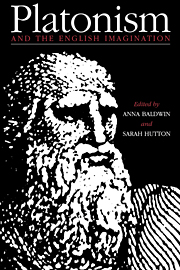1 - Plato and the Neoplatonists
Published online by Cambridge University Press: 15 December 2009
Summary
This chapter will be concerned both with Plato's own thought and with the Greek philosophers known as Neoplatonists who flourished from the third to the sixth century ad. Their understanding of Plato had a profound effect on later writers and thinkers and a proper appreciation of Plato's influence requires some knowledge of Neoplatonic thought. It is worth remembering however that Plotinus (ad204/5–270), the first Neoplatonist, lived nearly 600 years after Plato himself. The Neoplatonists treated Plato's thought as a unity and sought to interpret his works as a coherent whole. This sometimes led them to blur contradictions between different dialogues; in particular, they did not envisage any chronological development in Plato's views. Since the nineteenth century, Platonic scholarship has taken such development for granted. Plato is now usually seen as progressing from early dialogues such as the Laches, the Ion and the Charmides through the grand theory-building of the Phaedo, the Symposium and the Republic to a final phase of questioning and self-criticism represented by dialogues such as the Parmenides, the Sophist, the Theaetetus and the Philebus.
In most of Plato's dialogues his teacher, Socrates, is the main speaker. The early dialogues show Socrates searching for definitions of moral terms such as courage and temperance. He does this not by propounding definitions of his own but by testing definitions put forward by his interlocutors. These are regularly found wanting and the interlocutors' pretensions to knowledge are exposed as false and empty. Socrates' activity in these dialogues fits the picture given in Plato's Apology of Socrates.
- Type
- Chapter
- Information
- Platonism and the English Imagination , pp. 3 - 18Publisher: Cambridge University PressPrint publication year: 1994

